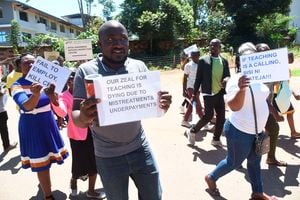Deadly reality of unsafe abortions done in Kenya

An estimated 2,600 Kenyan women die every year from complications due to unsafe abortions. These deaths are entirely preventable.
A few days ago, I stumbled upon a tweet from a young woman desperately seeking information on how to obtain an abortion at a well-known healthcare facility in Nairobi and how much it would cost.
The responses flooded in, but most of them didn’t point her towards safe, regulated services. Instead, the replies offered cheaper, clandestine alternatives in informal settlements. One particularly chilling reply mentioned a “chwom” — a hidden, makeshift location charging a mere Sh2,000.
This interaction paints a grim reality for many Kenyan women and girls who are left navigating a dangerous and confusing landscape, unaware of where to turn for safe abortion services. They are caught between misinformation, stigma, and a legal framework that, while offering protections, often feels distant and inaccessible.
Behind every desperate tweet lies the silent scream of countless women who have to risk their lives in back-alley clinics or endure unwanted pregnancies because the promise of safe, legal abortion is out of reach.
Every year, on Safe Abortion Day, reproductive health champions highlight devastating statistics, such as the seven women who die every day in Kenya from unsafe abortions. This grim figure shows the harsh reality that unsafe abortion remains the leading cause of maternal mortality and morbidity in the country. While the Kenyan Constitution, under Article 26(4), allows abortion under certain conditions, such as when the mother’s life or health is in danger, implementation remains elusive.
Medical professionals, even those acting within the legal framework, are often harassed, arrested, or prosecuted for providing these critical services. This has been happening since 2012, when the government arbitrarily withdrew the Standard Guidelines for reducing morbidity and mortality from unsafe abortion.
Ironically, Kenya’s reservation to the progressive Article 14(2) of the Maputo Protocol further complicates access to safe abortion services. While this international protocol advocates for women’s rights, including access to abortion in cases of rape, incest, and danger to the mother’s life, Kenya’s reluctance to fully embrace it contradicts the nation’s constitutional commitment to ensuring the highest attainable standard of healthcare for women.
In a landmark ruling in 2019, the High Court, in response to a case filed by Fida-Kenya, upheld abortion as a fundamental human right. The court condemned the government’s withdrawal of the 2012 guidelines, emphasising that it violated women’s rights. In 2022, the court declared that the arbitrary prosecution of patients seeking abortion care, or healthcare providers offering these services, is illegal.
As we approach International Safe Abortion Day this week, we must do more than just commemorate it. We must demand concrete action. The government must stop criminalising healthcare providers and the women who seek their help. Safe abortion is not a privilege, it is a human right, and essential for safeguarding women’s lives, health, and dignity.
Kavutha Mutua is an Advocate of The High Court of Kenya and a Human Rights practitioner. [email protected]





